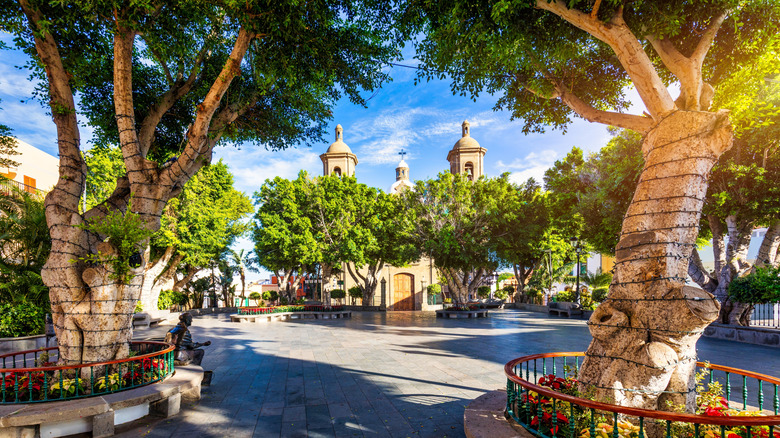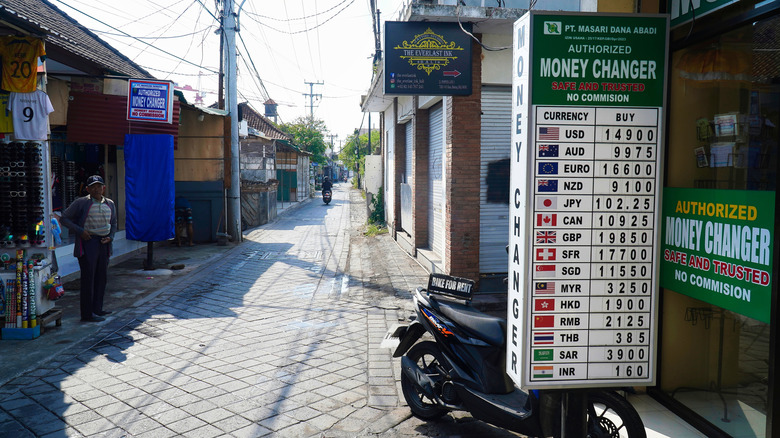11 Convincing Reasons To Retire Abroad
For many, the thought of retiring can seem like a destination far, far away, like some remote outpost at the end of a rambling bus ride. But the years pass by quickly, and sooner than you think, the twilight of your career approaches. Days without work edge closer and closer, and thoughts turn a little more seriously to retirement.
Many people opt to retire where they grew up, that sense of familiarity and extended network adding weight to their decision. But for some Americans, retiring overseas is a more attractive alternative. From small towns in Mexico to bustling cities in Southeast Asia, retirees from the United States have spread across the globe.
The benefits are multifold, almost as varied as the types of people that move abroad. Unfortunately, moving to another country to retire isn't as simple as showing up and staying put. There will be lots of legal paperwork to compile and complete, interviews might be necessary, financial considerations come into play, and then there are the logistics of physically uprooting your life and moving to another place. But the pay-off can be incredible, making it all worth it in the end. Drawing on our own experience living overseas and pulling from blogs focusing on that topic, here are some reasons why retiring abroad can be a savvy, liberating, and financially smart move for American citizens.
To immerse yourself in a new culture
After years of the daily grind at home, everything can feel a bit same-old, same-old. You know which road to turn on to get to the grocery store without thinking, you can comfortably predict what the specials might be at the local restaurant, and you can effortlessly picture the decorations that your neighbors will put up in their front yard for Halloween and/or Christmas. There is a lot to be said for familiarity, but it can be undeniably boring.
Retiring abroad can give your life a total reboot. For starters, you will be thrown into totally new surroundings, diving headfirst into a new culture. The possibilities are endless/ After a life in a U.S. city, maybe you want to try a sunshine-filled Greek island? Or following years in a rural town in the Midwest, might you be ready to live in a beautiful South American country?
In another country, you can learn a different way to navigate society, all while experiencing what tastes good and what tastes bad. Of course, this is one of the greatest aspects of living abroad — the food. You won't have to settle for watered-down dishes that have been compromised for American tastes. Retire overseas, and you can enjoy food as it was meant to be eaten, and even try a host of other specialities that you might not even know existed. Spending considerable time abroad allows you to get intimate with some of the best destinations for amazing street food on the planet. Think of things like the soup "nom banh chok" in Cambodia, the cream cheese pastry bugatsa in Greece, and piping hot corn arepas in Colombia.
Better weather
One major reason why people head overseas for retirement is the weather. You've worked for decades; you deserve a little bit (a lot) of sun. Maybe you live in a part of the country that experiences frigid winters, and you prefer the warmth? Or perhaps you have had enough of the wild tropical storms in the summer and want something a little stable? Well, guess what? There is a world of different weather out there; you just have to choose what you like.
Sure, you can try to find somewhere else in the United States that has the weather you like, but why limit yourself to one country when you have the whole world to choose from? Do you love the fresh feeling of spring? Then give a thought to the Colombian metropolis of Medellín (nicknamed the City of Eternal Spring). If you're looking for sun, sea, and sand, head to the Canary Islands, which are politically part of Spain but geographically closer to Northwest Africa. When it comes to weather, the world really is your oyster.
To be closer to family and friends
As the world's population becomes more and more mobile and people transport their lives elsewhere, it's possible that your family members or close friends have settled overseas. Think of how many family members, or friends, either live abroad, or have children or siblings that do. If that is the case, doesn't it make sense to follow them? After all, family is a tie that binds people perhaps more strongly than any other, even geography.
The advantages of retiring in a place close to friends and family overseas are evident, but are still worth stating. You won't have to wait for the holidays to see your loved ones, for example. You will also have a ready-made community there (albeit a small one), which always helps when moving to a new, unfamiliar place. At the end of the day, life is all about relationships.
Your money goes further
There is plenty of variability across the country, but the United States remains one of the most expensive places to live on the planet. And rises in prices that are still a holdover across the U.S. from the days of the Covid-19 pandemic don't help. For many, retiring overseas can be a way to make your money go that little bit further. In places like Costa Rica (a big draw for American retirees), housing can cost a third as much as in the U.S., and there is plenty you can do with that extra cash.
Housing isn't the only thing that is cheaper. Food (either because of subsidies or lower production costs) can cost substantially less. The average cost of cheddar in the United States in August 2025, for instance, was about $6.10 per pound. In the United Kingdom, it costs about £8.60 per kilogram, or about $5.30 per pound, which is about 13% lower. A cup of coffee in South Africa costs less than half what it costs in the United States. If you want to wring every drop of value out of your money, retiring abroad might be the way to go.
To learn a new language
Speaking more than one language is a fantastic trait for anyone. It not only helps to keep your brain agile, but it is also incredibly useful when traveling the world. A language helps you to better understand a place and its people. If you retire overseas, there is a decent chance you will find yourself in a society where the primary language is not English. That can be challenging at first, especially if you aren't a particularly competent proponent of that vernacular. But by immersing yourself in this new linguistic world, you'll pick it up soon enough.
Learning a new language in a country where it is spoken means you will use it regularly, and start to recognize its words and components and structure much more quickly than if you were studying it exclusively in the U.S. And progressing in any language — from struggling with basic sentences to the moment where you are no longer translating each word in your head into English — is such a rewarding achievement.
Even if you move to an English-speaking country, you will pick up a new language of sorts. That is why, soon enough, you will be able to tell someone that your legs are knackered (exhausted, used in the United Kingdom) after a day doing the messages (groceries, in Scotland), or hanging out with "kakis" (friends, in Singapore) wearing thongs (flip flops in Australia) at the beach.
Improved healthcare
The U.S. healthcare system is a massive industry. It is also a large, unwieldy, inefficient behemoth, as anyone trying to untangle deductibles, co-pays, and referrals can attest. Healthcare in the United States can also be prohibitively expensive for patients, which is why around 8% of the population does not have it. The healthcare system in the United States is a hotly debated subject, to say the least. Retirees are eligible for Medicare once they turn 65, but the coverage of Medicare might not be adequate for your particular health situation. You might still find yourself paying substantial out-of-pocket costs to maintain your upkeep in your twilight years.
This isn't the case in some other countries. There are nations beyond our shores that can offer comparable healthcare for a fraction of the cost, or even free in some cases. Malaysia, for example, has doctors trained in English-speaking countries, and hospitals that typically feature specialists in a number of fields. A simple doctor's visit is also cheap, about $20 or so for a simple consultation. And a check-up and teeth cleaning at a dentist can cost less than $50. Even in places without a strong public healthcare system, private healthcare is often available at more reasonable rates than in the United States.
Safety concerns
Many people in the U.S. might feel safe where they live. Others might not. In global terms, the United States isn't a particularly safe country. In 2023, there were more than 22,800 homicides in the United States, or about 6.8 per 100,000 residents (as reported by USA Facts). Compare this with Portugal, the sunny, welcoming country in Southern Europe, where the 2022 number was 0.72 murders per 100,000 population (per Statista). The yawning gap between those numbers is sobering.
According to the 2024 Global Peace Index, the United States ranks below Libya, Belarus, the Republic of the Congo, Egypt, Cuba, Turkmenistan, and Bangladesh, among many others. Right at the top of the list are nations like Iceland (the safest destination to retire in 2025), New Zealand (home to the clearest lake in the world), and Ireland. As you enjoy your retirement years, do you really want to be worried about your safety on top of everything else, or would you be happier going about your daily life without fear of harm?
Tax benefits
There are also potential tax benefits to living abroad. The Internal Revenue Service outlines that people who meet specific criteria can benefit from the foreign earned income exclusion. U.S. citizens need to be overseas residing in that country for the whole tax year, or be in a foreign country (or countries) for about 11 months of the year over a 12-month period. Retirees can make use of this exclusion if they live in a country that has a tax treaty with the United States. Housing allowances can also be eligible for deductions under this allowance. The most recent figures, per the I.R.S., are $120,000 per annum (for 2023), though it is important to note that not all income will fall under this exemption. For instance, any kind of pension, Social Security payments, or money from an annuity cannot count toward this.
For a retiree earning some money while overseas, such as through freelance work or small projects to make a little extra on the side, that windfall can be included in the tax-free allowance. Several countries are also attractive to American retirees due to their zero or low tax rates on income earned in the U.S. (such as Social Security payments). These include Panama, Costa Rica, and Greece. So, not only might you be living in a cheaper location when you retire abroad, you might also be saving on the tax you pay. While we are no tax experts — travelers should really consult with a consultant for the fine print — this seems like a win-win situation.
To embrace new wanderlust
The United States is a place of immense variety. Travelers can find frenetic destinations where the city lights never dim and the sounds of a thrumming metropolis are relentless. They can also experience vast areas of challenging wilderness, such as national parks with trails for experienced hikers only. There is so much to explore in the U.S., but the country is huge, and getting from place to place isn't always easy, fast, or cheap. Some continents are densely populated, jigsaws of smaller countries than the United States, and you can see a lot more within a more compact area.
Other countries might also have a more entrenched, comprehensive public transportation system, so you won't be reliant on a car, one less thing to worry about when adjusting to a new home. For example, Europe is only marginally larger than the United States, but its multitude of countries promises a wide variety of cultures, foods, landscapes, and sensibilities. If you have always wanted to explore Europe — we mean properly explore, not just hit the major highlights on a whirlwind tour — then retiring there will make it so much easier.
Expand your social circles
When you spend large stretches of time in another country, you tend to meet people who exist miles (literally and figuratively) beyond your normal community. It could be the dive instructor who took you out earlier in the day, or perhaps travelers from other parts of the world that you strike up a conversation with while on a tour. It could even be a family whose kids play with yours while on the beach. These new interactions are not only exciting in their own right, but they also make us feel more connected to the world at large.
The thing about retiring in the same place that you have lived is that you will be surrounded by familiar faces and places. For some people, that is ideal. For others, it feels like staying in the same rut, and retiring abroad can break that sense of emptiness. You can meet new people, the kinds of folk that you would never otherwise come into contact with. Instead of friends that you have known through school, work, or the neighborhood, you might start hanging out with the local salsa teacher, a retired couple from across the planet, or the owner of a casual, funky cafe near where you live.
Less stress
Of course, retiring overseas is not all roses, and adjusting to a new location comes with its own challenges. You need to sync yourself to a new rhythm of life, how people communicate and interact with one another, and so much more. If you don't know people in your new location, you can feel lonely, as if you are on a vacation that should have ended, but now you have nothing to do and nobody to do it with. Luckily, the pros easily outweigh the cons.
You can enjoy being in the moment by living in a place with a slower pace of life. You can find an affordable home close to a tropical beach, and as a 2022 paper published in Frontiers in Psychology (available on the National Library of Medicine) said, living by the sea is hugely beneficial for physical and mental health. In essence, retiring abroad can make your life a whole lot more relaxing, reduce your stress levels, and help you live longer.
Methodology
To compile this list of persuasive reasons to retire abroad, we started by reviewing blogs. We focused on those that cover expat life (like Expatsi Test) and financial planning for retirement, such as Canada Life. We also heavily leaned on our personal knowledge of living in three different continents, and the joy that working and living in a new place can generate.












